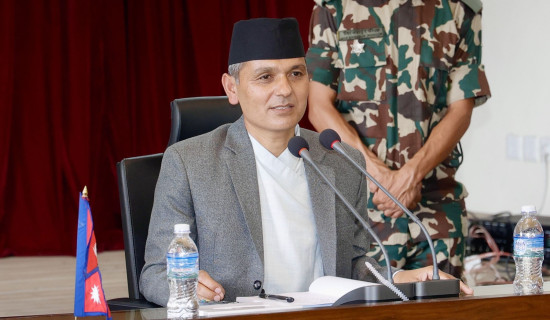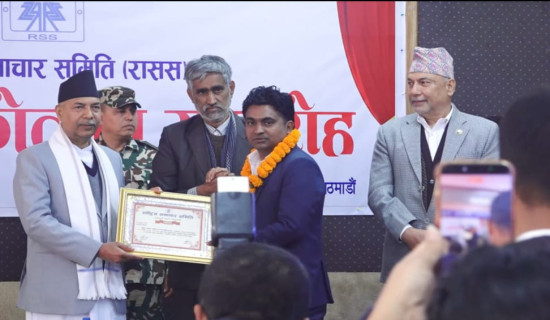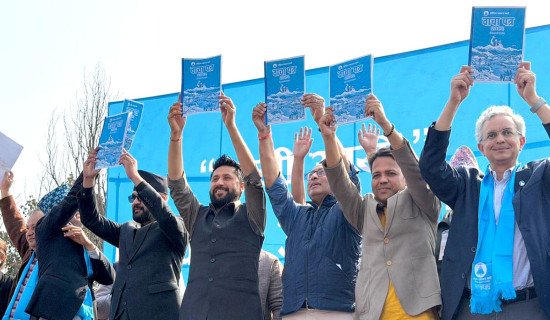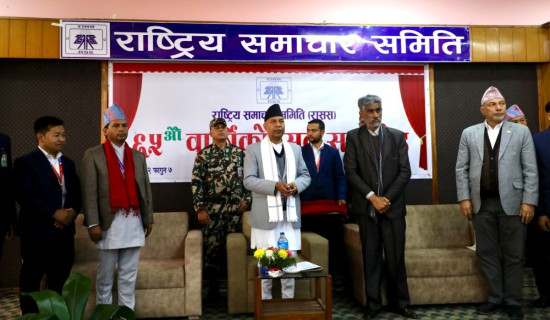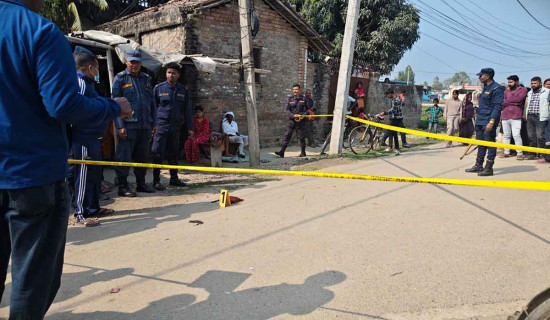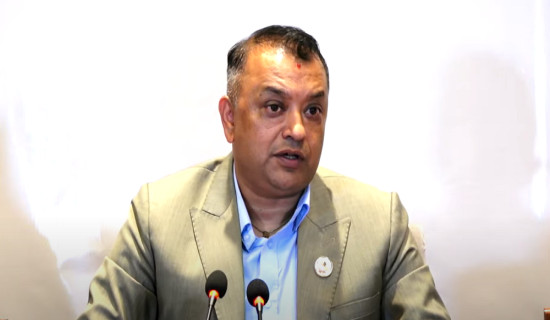- Friday, 20 February 2026
Unified Socialist A Cog In Ruling Alliance
This past week, the Nepal Communist Party (Unified Socialist) completed one year of its establishment. During this period, the party has proved to be a vital cog in the wheel of the five-party ruling coalition. Unified Socialist chair Madhav Kumar Nepal, a former prime minister and prominent communist leader who was forced to quit from his party after falling out with CPN-UML chair KP Sharma Oli, should be applauded for steadying and steering his party’s ship through all crises. The third largest component in the coalition government has become a major ally, as it has imparted essential support without which the ruling coalition would not have materialised. Without the backing from the party’s 23 parliamentarians, the current administration could not have taken shape and functioned the way it has been under NC’s leadership.
Toppling the Oli-led government and bringing the five-party coalition on board to set up a new government were key achievements of leader Nepal and his team of rebel leader. During its time in the government the Unified Socialist, along with the CPN-Maoist Centre and others, has played a significant part in seeing the highly contested Citizenship Act (First Amendment) Bill and the US-sponsored MCC through the parliament and helped resolve the crisis over the American State Partnership Programme (SPP).
NCP split
Before exiting from the UML, chair Nepal and his breakaway legislators, accused UML chair Oli of operating the party as an authoritarian leader. Oli ignored the requests and grievances of the Nepal-led group, which included respected leader and former Prime Minister Jhal Nath Khanal. He did not award significant cabinet responsibilities to the parliamentarians belonging to Nepal’s side. Oli sidelined the pro-Nepal leaders and lawmakers while making political selections in significant posts.
With the rift widening, Nepal, Khanal and Maoist Centre chair Pushpa Kamal Dahal Prachanda joined up to pile pressure on Oli to resign as the chief then Nepal Communist Party to clear the way for the Maoist chief to become the new NCP chair. Having recognised that quitting the party chair’s position would be a fatal mistake, Oli denied the demand and went forward by dissolving the House of Representatives twice in six months, only to be resurrected by the Supreme Court verdict. After this, the Maoist parliamentarians broke away from the Oli-headed NCP. After the Supreme Court restored the UML, the Nepal-led faction split away to form the Unified Socialist.
The genesis of the Unified Socialist, however, was not an easy one, since chair Nepal experienced hurdles during and after his party’s formation. Ten UML legislators, regarded as his primary supporters during the internal conflict with the UML elites, did not side with him when he broke away. They stayed back at the UML. Among the 10 leaders accused of inciting Nepal to take on Oli were Ghanshyam Bhusal, Raghuji Pant, Astha Laxmi Shakya, and Yogesh Bhattarai, who did not back Nepal when the new party came into being.
Following Nepal and his team of legislators’ brave effort to back Sher Bahadur Deuba to be elected as Prime Minister and later throwing weight behind him during the vote of confidence, the new alliance government came into existence. The government thereafter lent its strategic cooperation to leader Nepal to make up the Unified Socialist party in the face of the UML’s demand to annul the House membership of Nepal and his team of rebel MPs. The government issued a special ordinance to help leader Nepal’s legislators continue as House members. This had enraged the UML and its chair. As a result, the frustrated UML disrupted the House for around six months following their failure to get the rebels’ membership invalidated.
After undergoing the trials and tribulations, the Unified Socialist had emerged as an able ally in the ruling coalition. Besides helping the government run seamlessly, the support and participation of the Unified Socialist enabled the ruling alliance to produce resounding results in the local elections held in May this year. The five-party alliance of the NC, Maoist Centre, Unified Socialist, Janata Samajwadi, and Rastriya Janamorcha secured landslide votes in the local elections.
The outcome in the local poll, which was possible owing to the electoral alliance among five parties, including the Unified Socialist, has now galvanised the ruling alliance to build the same alliance in the federal and provincial elections to be conducted in November this year. If all goes as planned, the five-party alliance would achieve a large majority in the coming election to pick governments at the centre and provinces.
According to chair Nepal, the ruling alliance may offer his party around 18 to 20 seats under the seat-sharing arrangement. If that happens, the party may add a few more seats in the federal parliament under the proportional voting arrangement. In this way, the Unified Socialist Party will continue to enjoy its brush with power by being a crucial part of the next parliament and government. To boost their prospects of getting more seats during the seat-sharing exercise, leader Nepal and other like-minded communist leaders such as the Maoist chair have attempted to establish their front.
Despite having enjoyed strong backing from the alliance party leaders during its one year of existence, the party has encountered other troubles: nomination of leaders to ministerial portfolios put the party in a dilemma as managing ministerial position hopefuls produced a greater headache for the party chair. But the party chair navigated skillfully, which is visible from his success in replacing ministers from the quot. During the year, there have been speculations whether the Unified Socialist leaders, including leader Nepal and Khanal, will rejoin the UML. Considering the current climate in the party, these leaders will not return to the UML fold anytime soon. The reason is - bad blood still exists between these leaders and the UML chair.
Calls from many UML leaders for breakaway leaders to return to the UML have fallen on the deaf ears of Unified Socialist leaders, who have demonstrated a disdain for joining the mother party. They have stated that they would think of joining the UML only after Oli issued a formal apology for dissolving the Hour and for the blunders he committed when he commanded the NCP. Given his temperament, chair Oli might resign rather than tendering apology to his nemeses- Nepal and Khanal-and other rebel leaders.
(Upadhyay is Managing Editor of this daily)











